There were countless times on D-Day and in the fighting in Normandy that followed when Leon Gautier could have been killed or grievously wounded.
He and his comrades in an elite French unit were among the first waves of Allied troops to storm the heavily defended beaches of Nazi-occupied northern France, beginning the liberation of western Europe. The commandos spent 78 days straight on the front lines, their numbers dwindling from one firefight to the next.
Of the 177 who waded ashore on the morning of June 6, 1944, just two dozen escaped death or injury, Gautier among them.
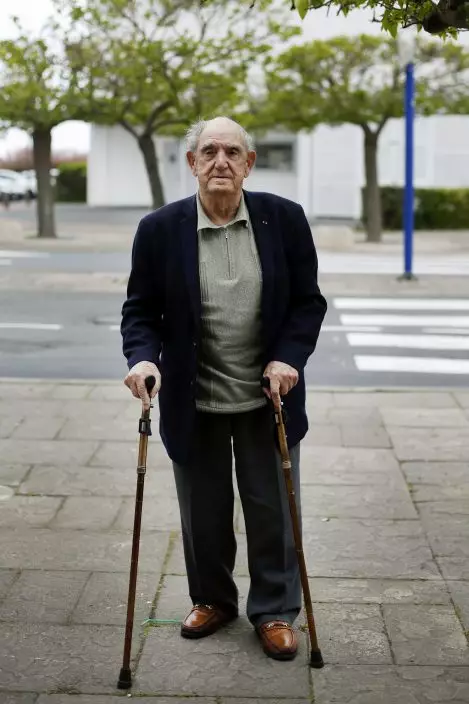
In this photo made Thursday, May 9, 2019, French World War II veteran Leon Gautier poses for a picture outside his house, in Ouistreaham, Normandy. He and his comrades in an elite French unit were among the first waves of Allied troops to storm the heavily defended beaches of Nazi-occupied northern France, beginning the liberation of western Europe. The commandos spent 78 days straight on the front lines, their numbers dwindling from one firefight to the next. (AP PhotoThibault Camus)
Then, his good fortune ran out.
Back in England for some well-deserved R&R, an impatient Gautier jumped off a moving train. He injured his left ankle so badly that he was forced to sit out much of the rest of the war, which ended in Europe with Germany's surrender in May 1945.
The now 96-year-old Gautier rolls up a trouser leg to show how the ankle remains painfully swollen three quarters of a century later, his story neatly encapsulating the lunatic and arbitrary nature of war .
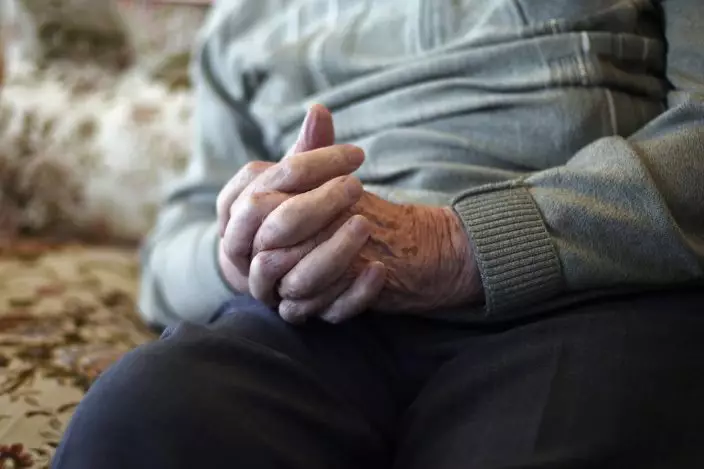
In this photo made Thursday, May 9, 2019, French World War II veteran Leon Gautier poses for a picture in his house, in Ouistreaham, Normandy. Of 177 in an elite French unit who landed in Normandy on June 6, 1944, just two dozen survived unscathed, Gautier among them. (AP PhotoThibault Camus)
As Gautier chuckles at his own tales, cracks jokes and charms the ticket lady guarding the door of the museum that overlooks the beach near where he and his comrades landed 75 years ago, it is impossible not to wonder: Who will tell World War II stories with such verve and authority when he and the rest of his generation are gone?
In the huge D-Day invasion force made up largely of American, British and Canadian soldiers, French Capt. Philippe Kieffer's commandos ensured that France had feats to be proud of too, after the dishonor of its Nazi occupation, when some chose to collaborate with Adolf Hitler's forces.
"For us it was special. We were happy to come home. We were at the head of the landing. The British let us go a few meters in front, 'Your move, the French,' 'After you,'" Gautier recalls. "Most of us had left France in 1940, four years earlier, so for us it was the liberation of France, the return into the family."
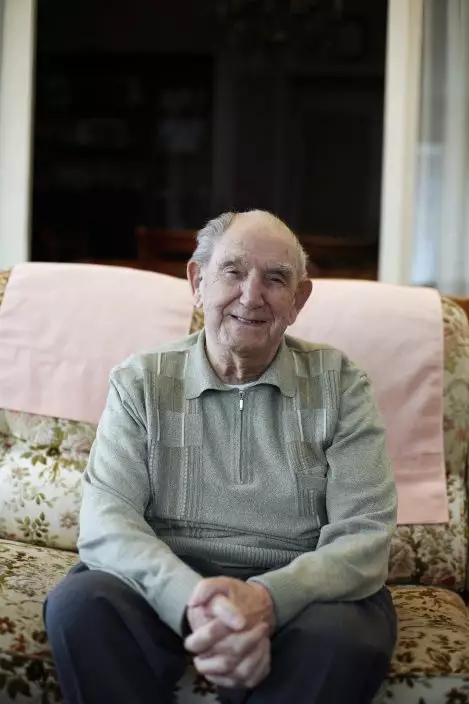
In this photo made May 9, 2019, French World War II veteran Leon Gautier poses for a picture in his house, in Ouistreaham, Normandy. His memories of the war are as vivid as ever. “War is ugly. War is misery,” he says. He wants younger generations to never forget that. (AP PhotoThibault Camus)
After the bloodshed of World War I, Gautier's generation had grown up on a diet of hatred for neighboring Germany. He was 17 when he joined the navy in 1940. When France fell in June that year to the Nazi blitzkrieg, he shipped off to England, where a French general, Charles de Gaulle, was rallying his countrymen.
Volunteering, as Gautier did, for Kieffer's commando unit meant undergoing brutal and dangerous training. The men became so hardened that on D-Day they came ashore carrying four days' worth of rations and ammunition, 30 kilograms (nearly 70 pounds) in all. They sprinted up the beach with their heavy sacks.
Their initial objective was a heavily fortified bunker. Although the strongpoint was just a few kilometers (miles) away, it took them four hours of fighting to get there and take it. On the beach, they cut through barbed wire under a hail of bullets.
"We were being shot at, but we shot at them too," Gautier remembers. "When we arrived near the walls of the bunkers, we threw grenades in through the slits."
The commandos were trained for quick in-and-out raids to take prisoners, gather intelligence and destroy things. Gautier remembers that not all of the newly liberated inhabitants of Ouistreham where they fought were pleased to see them, figuring the troops would soon turn tail and be replaced again by vengeful Germans.
"I told them, 'We're not leaving! We're here for good!'" Gautier recalls. "I don't know that they believed me."
Just three of Kieffer's commandos survive. Gautier is the youngest. The oldest is 105. A 1943 photo of 70 of them, taken in Scotland where they trained, shows square chins and resolute looks under the green berets they made famous.
One of the benefits of longevity: Gautier has a great-great-great-grandson born, incredibly, on the 6th of June, two years ago.
Gautier and his wife, Dorothy, were married for more than 70 years. She died in 2016 at 91. They met in 1943 when he was stationed in England. Seriously injured by a German artillery shell during the war, she lived with a metal plate over the hole in her skull and had persistent headaches.
Gautier worked after the war building car bodies. He and his wife lived in England, where they had two daughters. Later, the family moved to Africa, where he was a workshop director, training mechanics in Nigeria and Cameroon.
The family was forced to return to France after Gautier was seriously injured in a traffic accident. Once recovered, he worked as a vehicle inspector and settled with Dorothy in Ouistreham, where Gautier and his comrades fought in 1944.
Gautier says he doesn't like talking about the war: "The older you get, you think that maybe you killed a father, made a widow of a woman. ... It's not easy to live with."
Yet he has devoted much of his life since then making sure that lessons from the war aren't forgotten by giving countless interviews, taking part in countless commemorations and helping put together the museum in Ouistreham that commemorates the commandos.
"The younger generations have to be told, they need to know," Gautier says. "War is ugly. War is misery, misery everywhere."
PARIS (AP) — French President Emmanuel Macron warned Thursday that Europe could “die” if it fails to build its own robust defense as Russia’s war in Ukraine rages on, or if it fails to undertake major trade and economic reforms to compete with China and the U.S.
Macron urged Europeans to become more ambitious in a fast-changing world to face the challenges of war, fierce trade competition, energy scarcity, climate change and increasing authoritarianism.
In a nearly two-hour speech at Sorbonne University in Paris, Macron said that the continent is divided and “too slow and lacks ambition” at a time when the 27-member European Union needs to become a superpower, defend its own borders and speak with one voice if it wants to survive and thrive.
“Our Europe today is mortal,” Macron said. “It can die and that depends solely on our choices,” he added. He called on people to make those choices now because, “it’s today that Europe is between war and peace.”
Russia's full-scale invasion of Ukraine, now in its third year, is an existential threat and Europe isn't armed enough to defend itself when “confronted by a power like Russia that has no inhibitions, no limits,” Macron said.
‘Our ability to ensure our security is at stake," Macron said. “Russia mustn’t be allowed to win.”
Europe now has the “good fortune” of having the Biden administration’s commitment to supporting Ukraine, Macron said. But, in a year of key elections around Europe, in the U.S. and elsewhere, support may fragment or disappear entirely, he added.
“Europe must become capable of defending its interests, with its allies by our side whenever they are willing, and alone if necessary,” Macron said.
Strong armies, a European rapid intervention program and force, tanks, a missile shield and other weapons, produced in Europe, will need the support of “a joint diplomatic force that will speak with one voice and build bridges with Africa and Latin America,” the French leader said.
“Only then will Europe show that it's not a United States’ lap dog, and that it also knows how to talk to other regions of the world,” he said.
France has been a firm supporter of Ukraine in its fight against Russian aggression, and Macron has often clashed with other Western leaders as he has insisted that Europe must stand by the country at any cost. The French president alarmed European leaders by saying recently that sending Western troops into Ukraine to shore up its defenses shouldn’t be ruled out.
Referring to trade practices of China and the U.S., Macron said “the two world powers have decided not to respect the rules of global trade” by shoring up protections and subsides while Europe’s industry remains open and is stuck in overregulation.
“Let’s do the same, we are in competition,” Macron said.
“We must buy faster, we must produce more and we must buy more that is made in Europe. That is key,” Macron said.
Thursday's speech came less than two months before a pivotal European Parliament election.
Macron, an avid advocate of a united and assertive Europe, also rallied support for his centrist Renaissance party before the June 6-9 vote as far-right parties lead the moderate coalitions in the polls. He called for safeguarding democratic values as the “authoritarian model” was becoming “more popular” across the continent.
The war in Ukraine and immigration are top priorities for European Union voters, according to polls. Far-right parties have gained support by criticizing Macron’s government policies on both issues. Macron acknowledged divisions on immigration policies, including on asylum and deportation rules for those who have arrived to Europe illegally.
He emphasized the need for an effective response and Europe-wide coordination for curbing illegal immigration, closer cooperation with immigrants' countries of origin and a unified, relentless fight against human traffickers.
Macron criticized the idea of striking an agreement, as Britain as done, with countries in Africa and elsewhere to transfer immigrants there.
“This is a betrayal of our values that ultimately leads us to dependency on other counties,” Macron said.
The British government earlier this week approved a law allowing the deportation of some migrants who enter the country illegally to Rwanda.
Macron lost his majority in France’s most influential house of parliament, the National Assembly, after the 2022 election to the far-left coalition and the far-right National Rally party.
The social situation in France remains tense as Paris prepares to host the Olympic Games this summer, amid protests from teachers and police officers, and farmer demonstrations in recent weeks. The protests follow huge rallies last year against Macron’s ultimately successful proposal to increase the retirement age from 62 to 64.
Barbara Surk reported from Nice, France. Lorne Cook contributed to this report from Brussels.
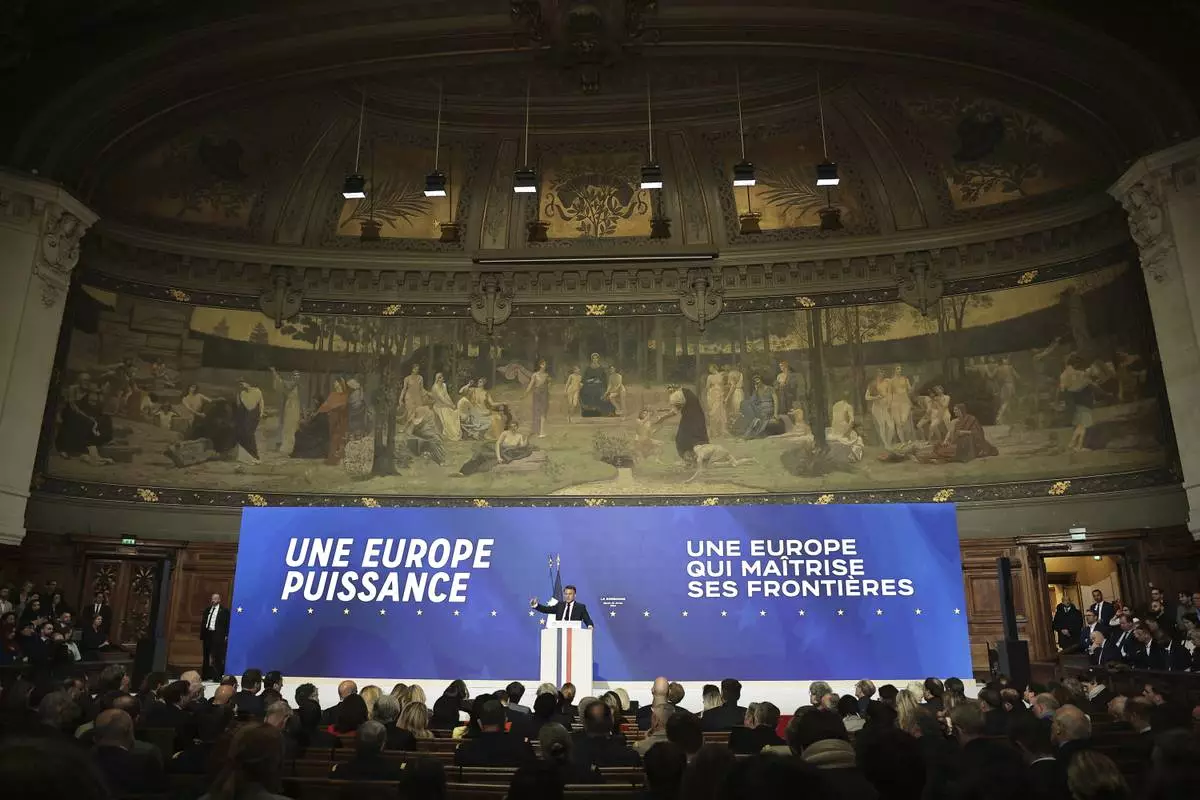
French President Emmanuel Macron delivers a speech on Europe in the amphitheater of the Sorbonne University, Thursday, April 25 in Paris. 2024. French President Emmanuel Macron will outline his vision for Europe as a more assertive global power at the backdrop of war in Ukraine, security, and economic challenges in a speech ahead of pivotal election for the European Parliament in June. (Christophe Petit Tesson, Pool via AP)
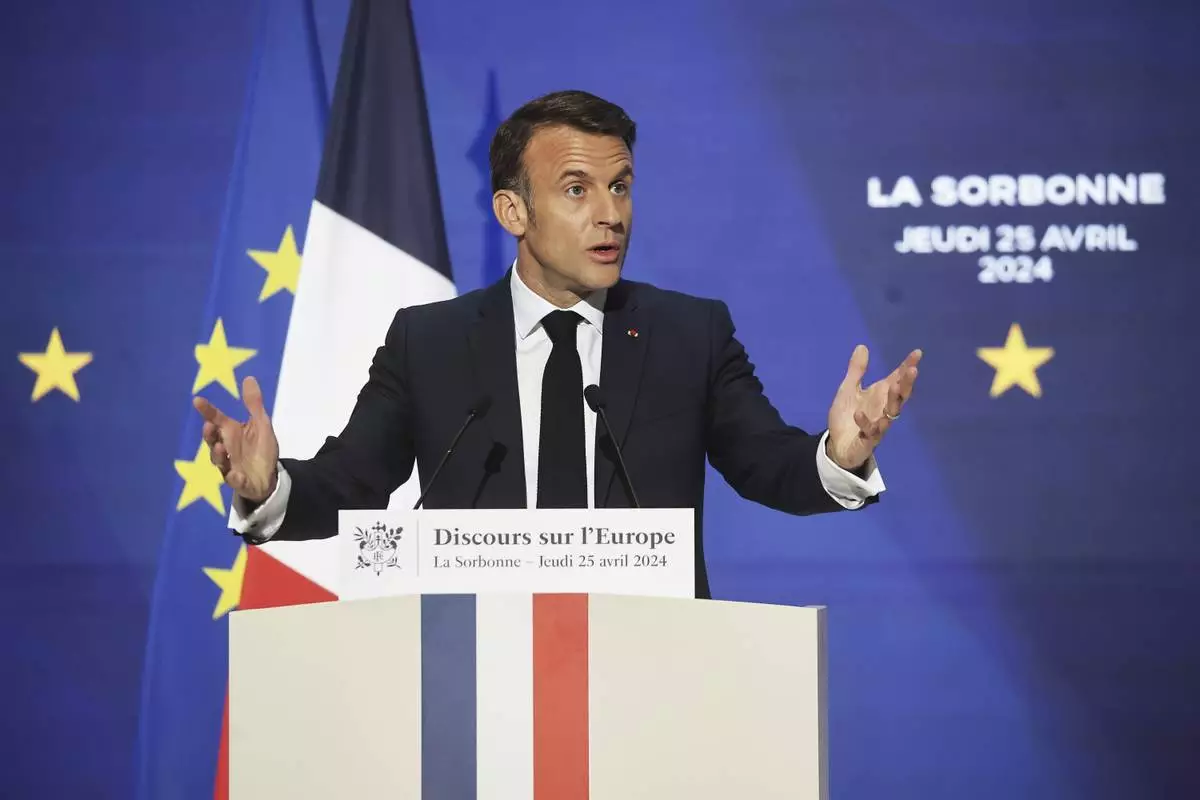
French President Emmanuel Macron delivers a speech on Europe in the amphitheater of the Sorbonne University, Thursday, April 25 in Paris. 2024. French President Emmanuel Macron will outline his vision for Europe as a more assertive global power at the backdrop of war in Ukraine, security, and economic challenges in a speech ahead of pivotal election for the European Parliament in June. (Christophe Petit Tesson, Pool via AP)
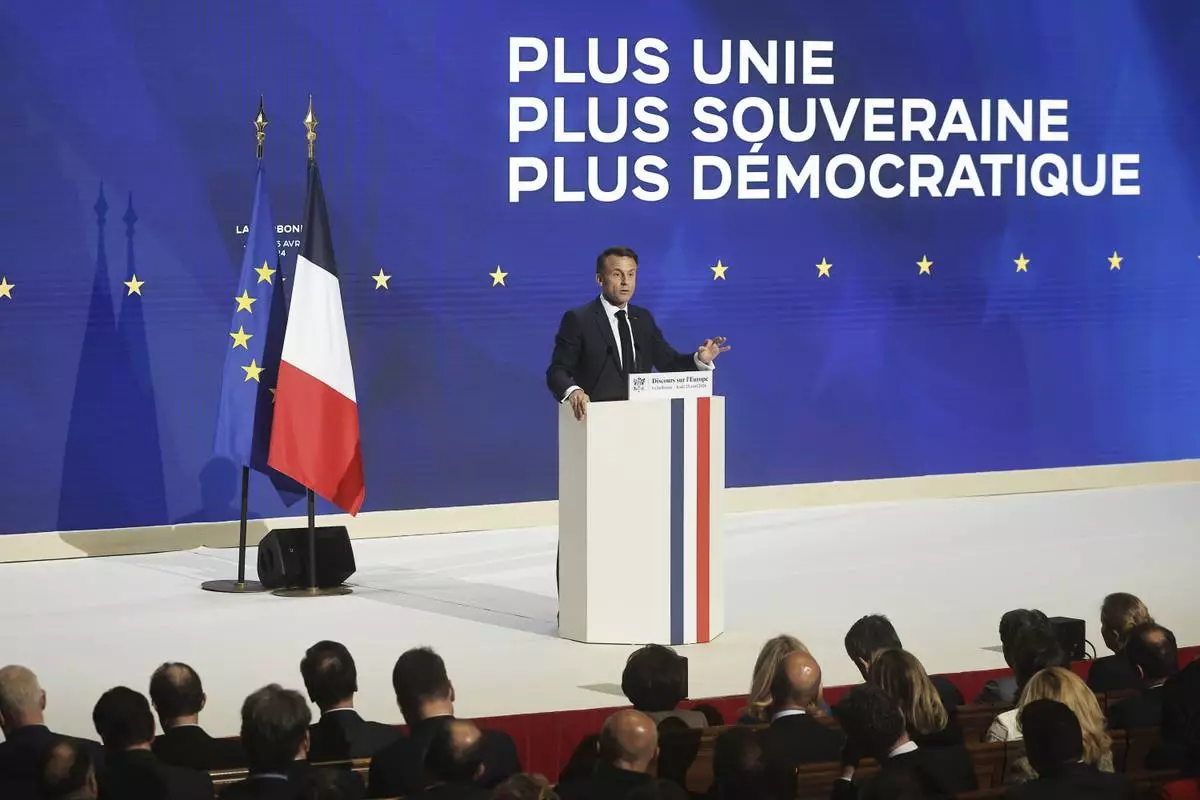
French President Emmanuel Macron delivers a speech on Europe in the amphitheater of the Sorbonne University, Thursday, April 25 in Paris. 2024. French President Emmanuel Macron will outline his vision for Europe as a more assertive global power at the backdrop of war in Ukraine, security, and economic challenges in a speech ahead of pivotal election for the European Parliament in June. (Christophe Petit Tesson, Pool via AP)
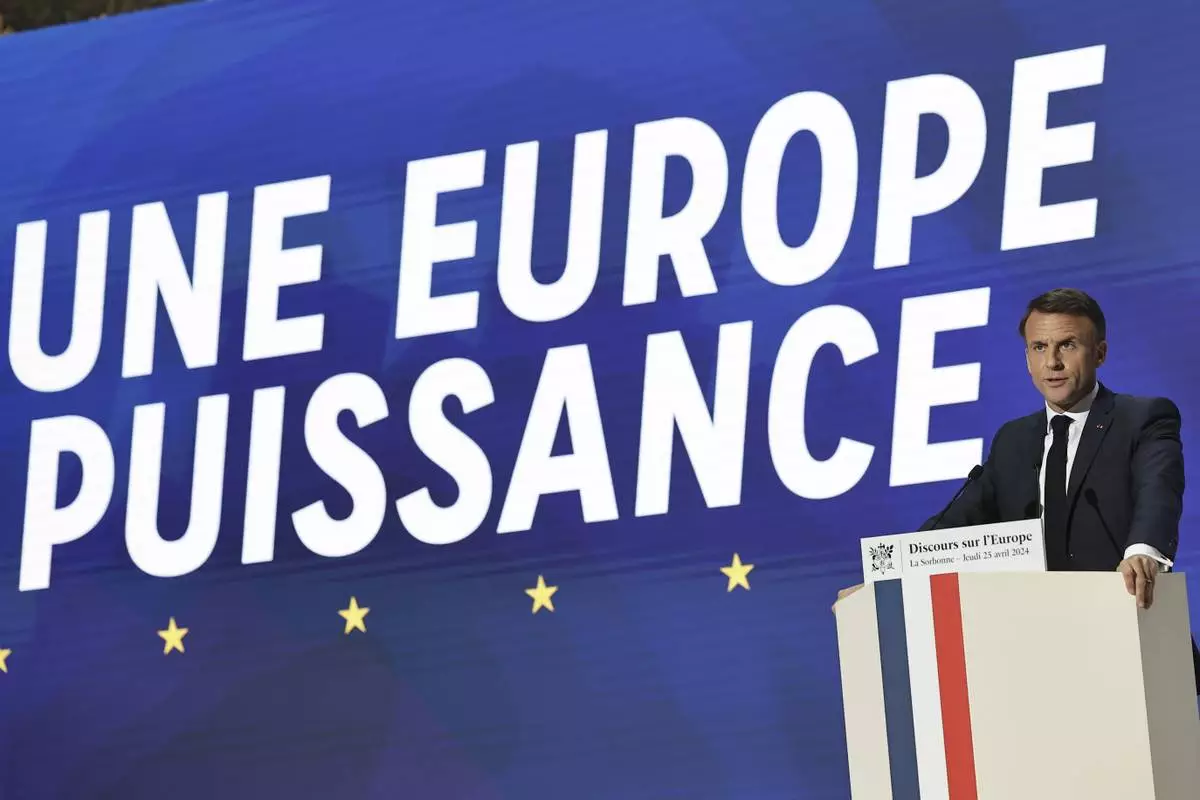
French President Emmanuel Macron delivers a speech on Europe in the amphitheater of the Sorbonne University, Thursday, April 25 in Paris. 2024. French President Emmanuel Macron will outline his vision for Europe as a more assertive global power at the backdrop of war in Ukraine, security, and economic challenges in a speech ahead of pivotal election for the European Parliament in June. (Christophe Petit Tesson, Pool via AP)
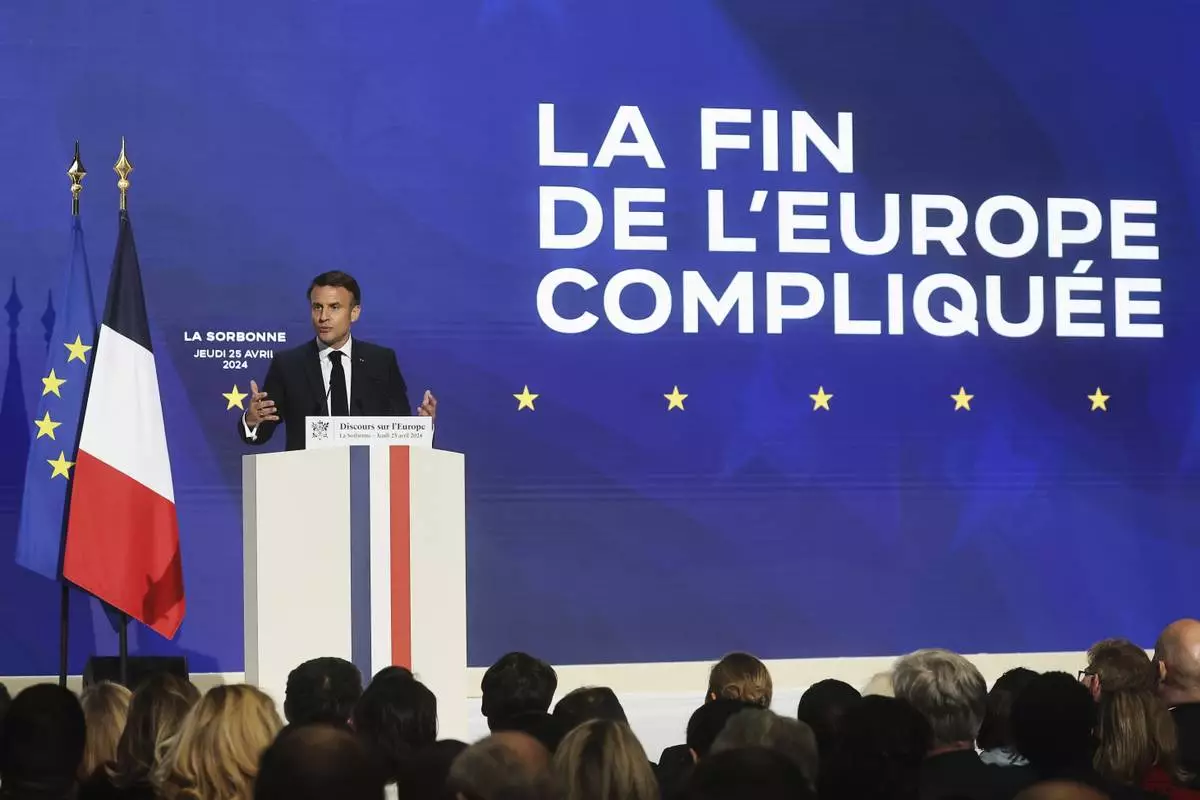
French President Emmanuel Macron delivers a speech on Europe in the amphitheater of the Sorbonne University, Thursday, April 25 in Paris. 2024. French President Emmanuel Macron will outline his vision for Europe as a more assertive global power at the backdrop of war in Ukraine, security, and economic challenges in a speech ahead of pivotal election for the European Parliament in June. (Christophe Petit Tesson, Pool via AP)
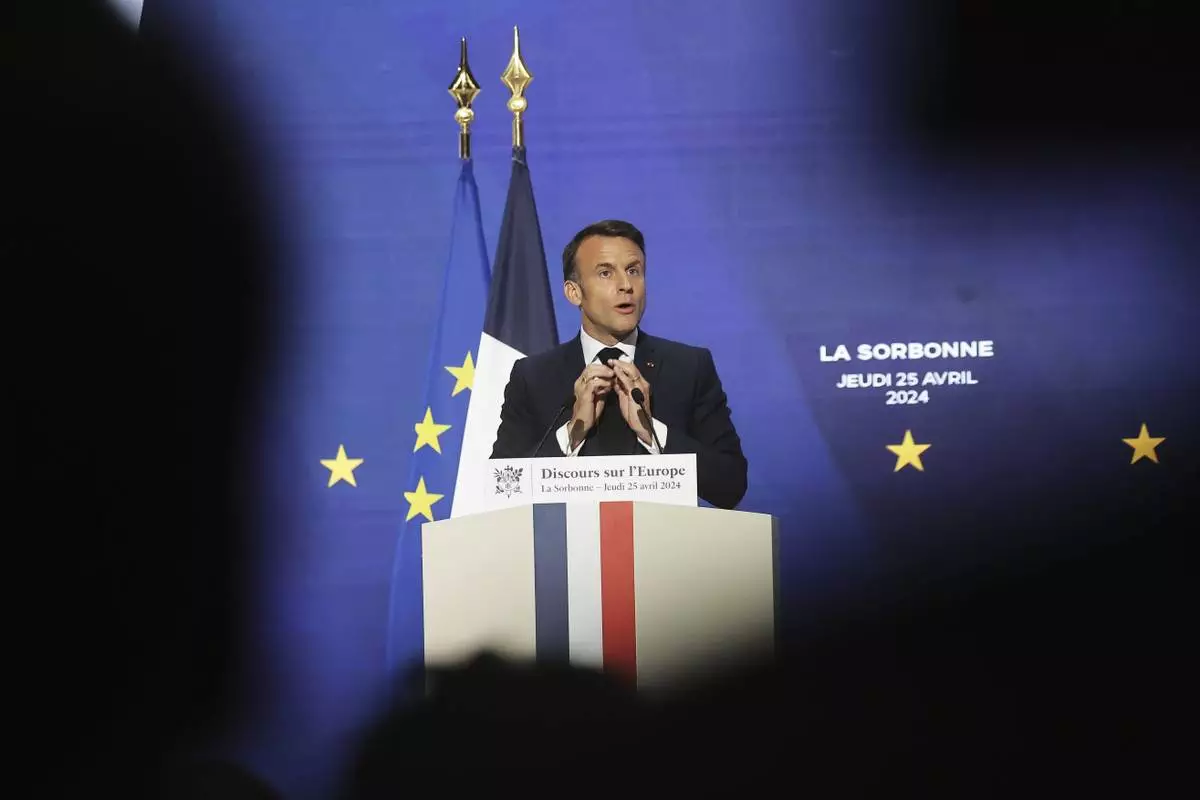
French President Emmanuel Macron delivers a speech on Europe in the amphitheater of the Sorbonne University, Thursday, April 25 in Paris. 2024. French President Emmanuel Macron will outline his vision for Europe as a more assertive global power at the backdrop of war in Ukraine, security, and economic challenges in a speech ahead of pivotal election for the European Parliament in June. (Christophe Petit Tesson, Pool via AP)
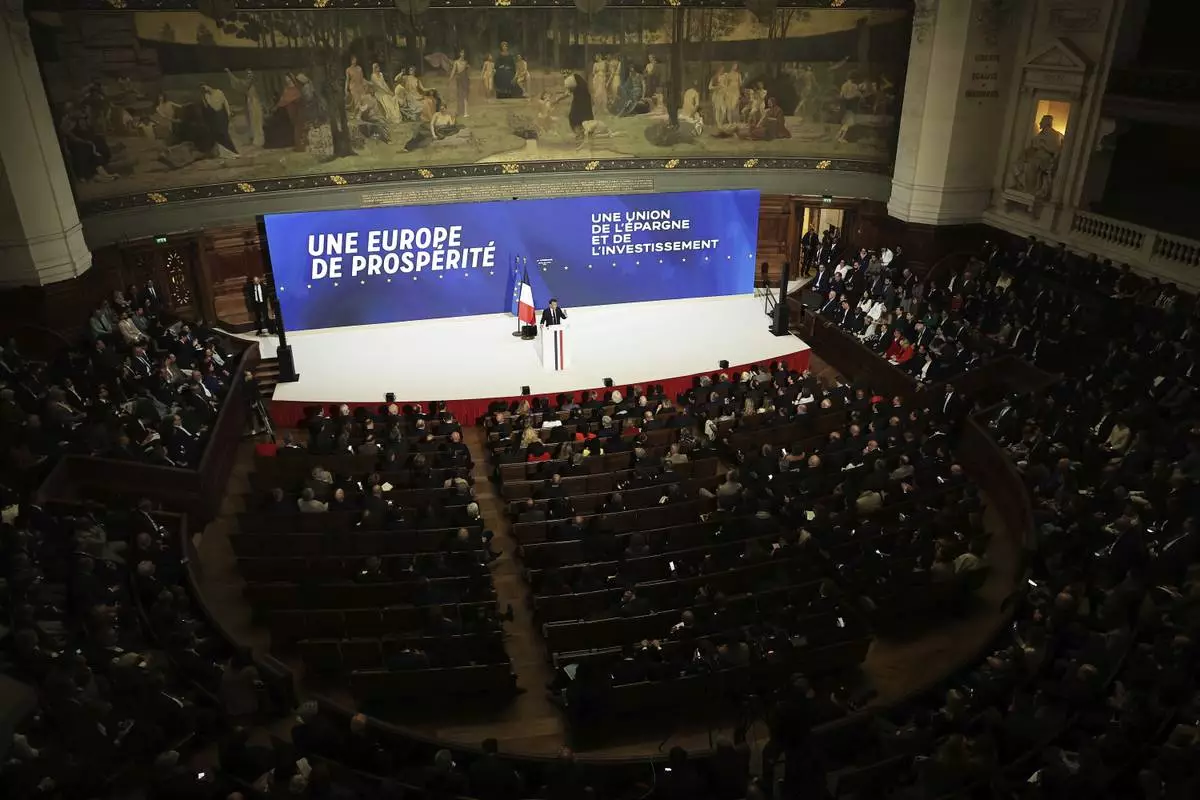
French President Emmanuel Macron delivers a speech on Europe in the amphitheater of the Sorbonne University, Thursday, April 25 in Paris. 2024. French President Emmanuel Macron will outline his vision for Europe as a more assertive global power at the backdrop of war in Ukraine, security, and economic challenges in a speech ahead of pivotal election for the European Parliament in June. (Christophe Petit Tesson, Pool via AP)
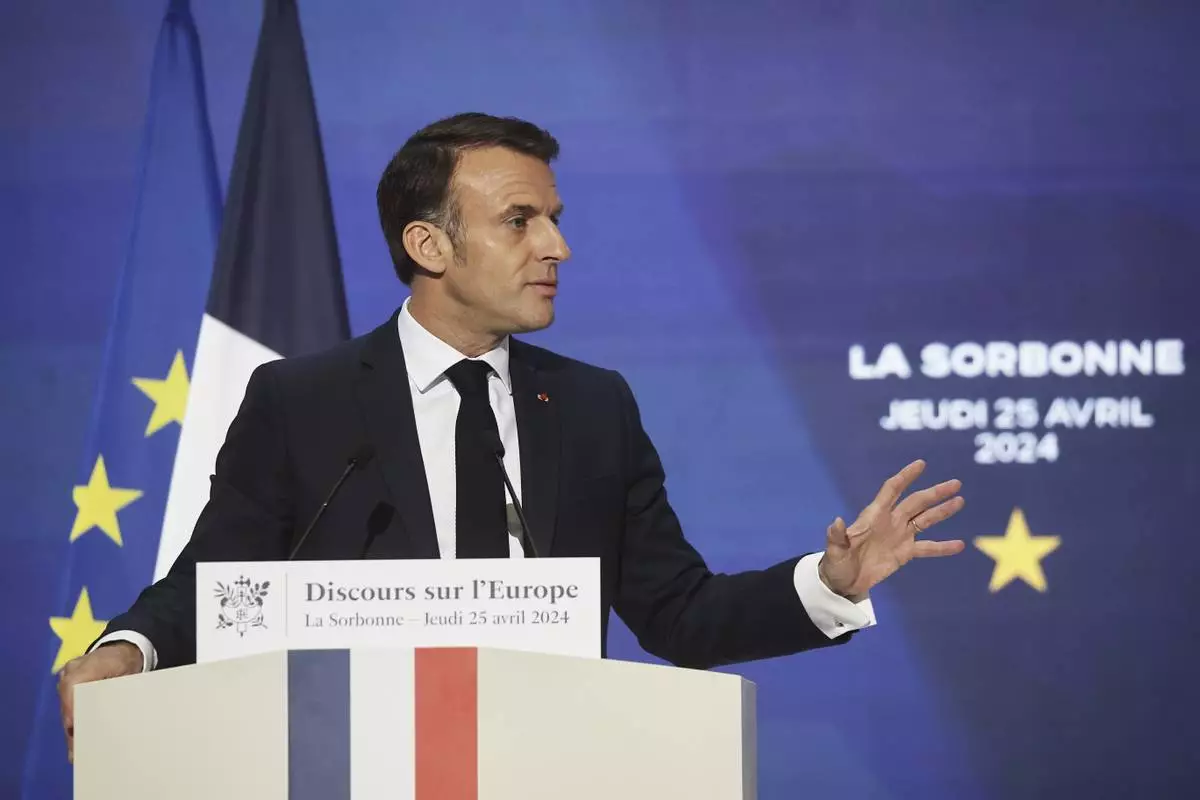
French President Emmanuel Macron delivers a speech on Europe in the amphitheater of the Sorbonne University, Thursday, April 25 in Paris. 2024. French President Emmanuel Macron will outline his vision for Europe as a more assertive global power at the backdrop of war in Ukraine, security, and economic challenges in a speech ahead of pivotal election for the European Parliament in June. (Christophe Petit Tesson, Pool via AP)
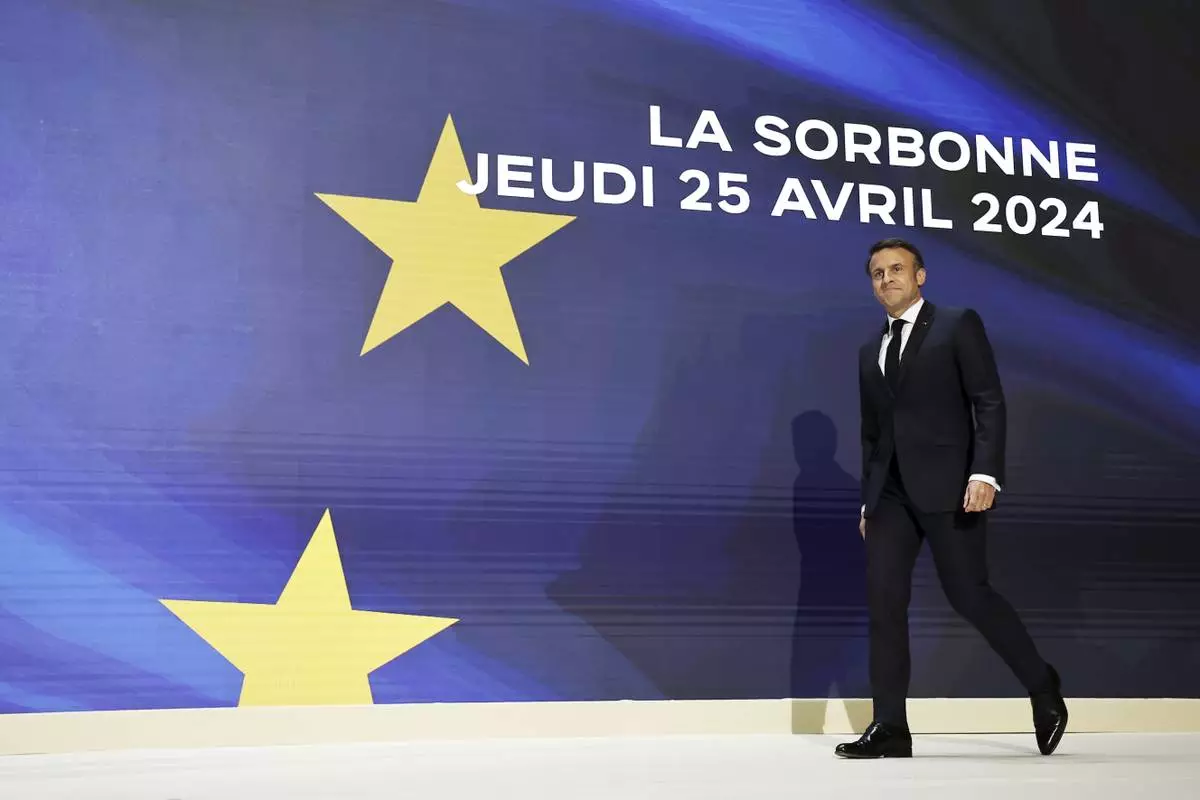
French President Emmanuel Macron arrives to deliver a speech on Europe in the amphitheater of the Sorbonne University, Thursday, April 25 in Paris. 2024. French President Emmanuel Macron will outline his vision for Europe as a more assertive global power at the backdrop of war in Ukraine, security, and economic challenges in a speech ahead of pivotal election for the European Parliament in June. (Christophe Petit Tesson, Pool via AP)
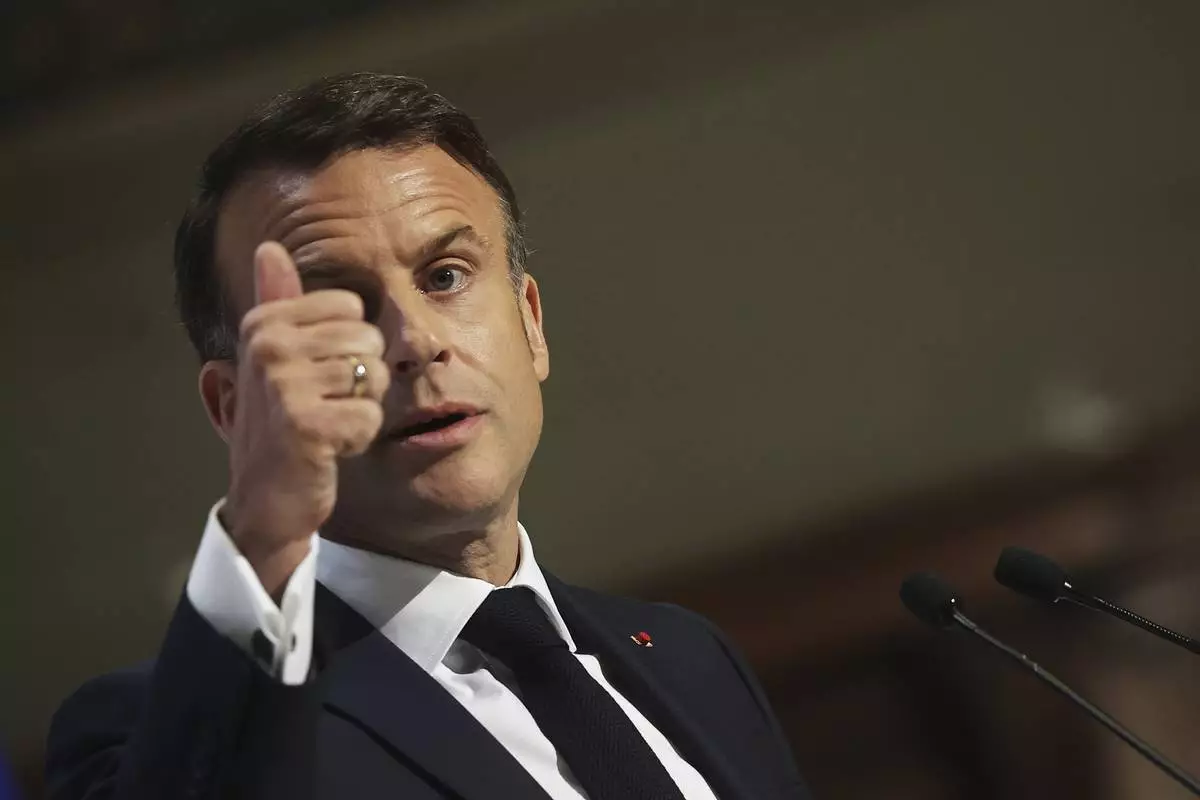
French President Emmanuel Macron delivers a speech on Europe in the amphitheater of the Sorbonne University, Thursday, April 25 in Paris. 2024. French President Emmanuel Macron will outline his vision for Europe as a more assertive global power at the backdrop of war in Ukraine, security, and economic challenges in a speech ahead of pivotal election for the European Parliament in June. (Christophe Petit Tesson, Pool via AP)
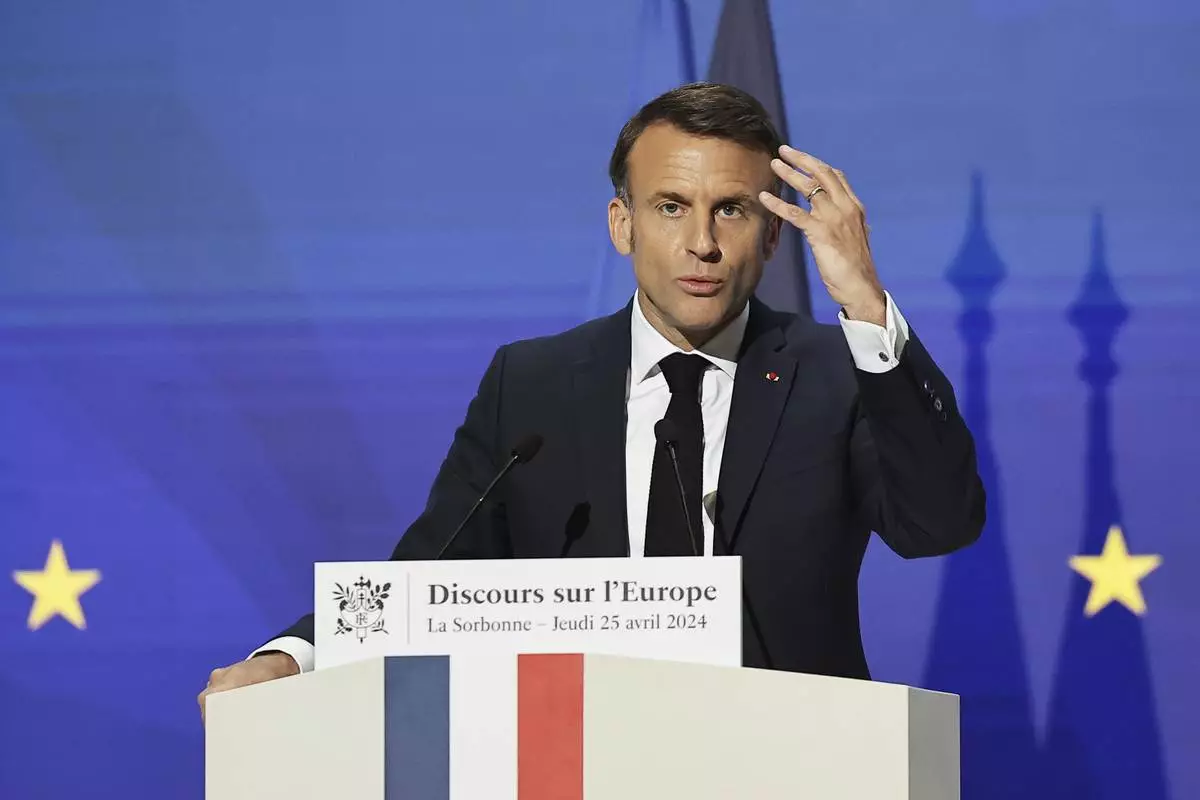
French President Emmanuel Macron delivers a speech on Europe in the amphitheater of the Sorbonne University, Thursday, April 25 in Paris. 2024. French President Emmanuel Macron will outline his vision for Europe as a more assertive global power at the backdrop of war in Ukraine, security, and economic challenges in a speech ahead of pivotal election for the European Parliament in June. (Christophe Petit Tesson, Pool via AP)
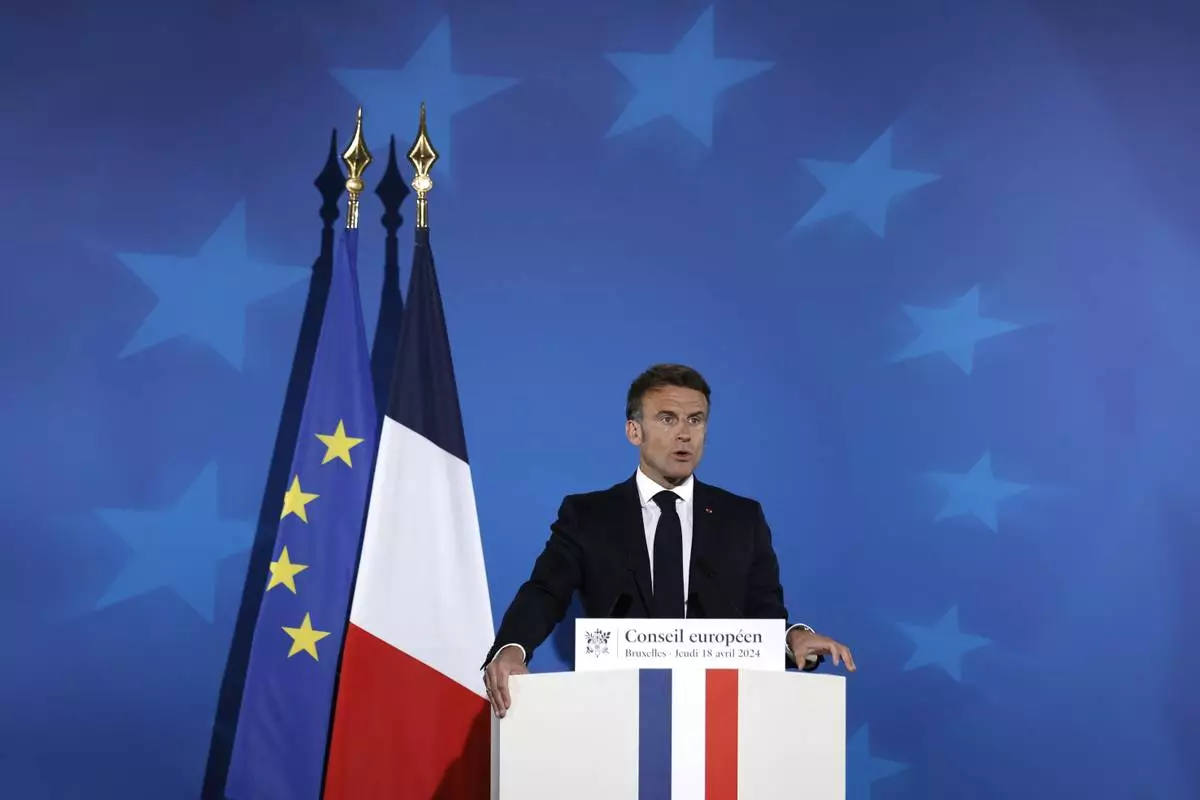
French President Emmanuel Macron speaks during a media conference at an EU summit in Brussels, Thursday, April 18, 2024. European Union leaders on Wednesday debated a new "European Competitiveness Deal" aimed at helping the 27-nation bloc close the gap with Chinese and American rivals amid fears the region's industries will otherwise be left behind for good. (AP Photo/Omar Havana)
























